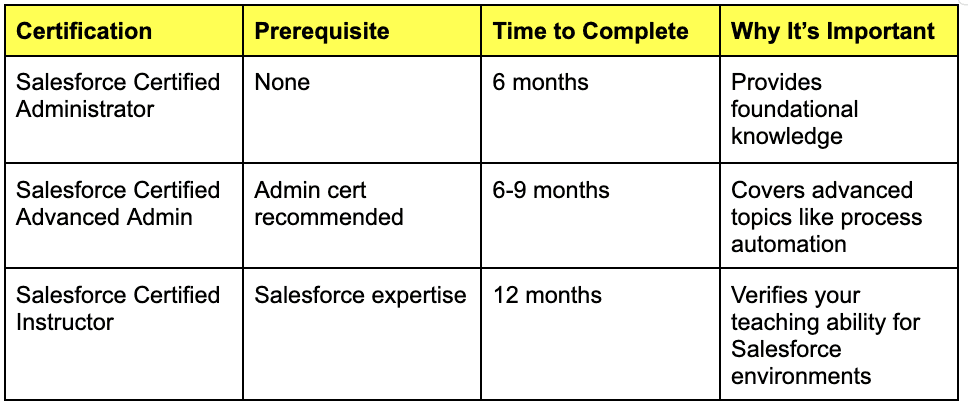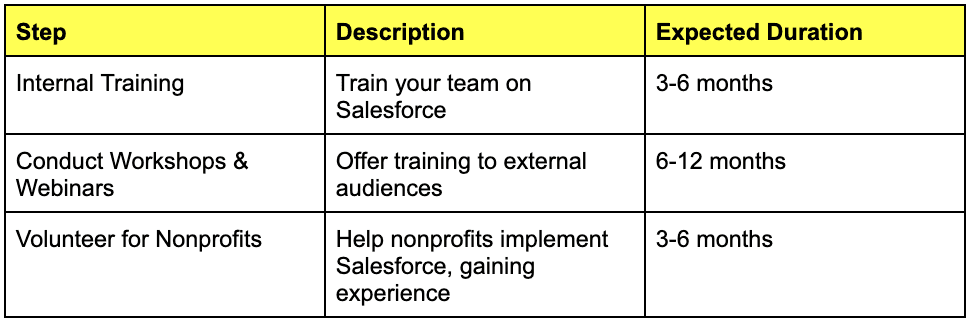So, you want to become a Salesforce Trainer? Fantastic choice! Imagine being the go-to expert who not only masters Salesforce but also helps others unlock its full potential. As the Salesforce ecosystem grows, so does the demand for trainers who can teach others how to navigate its complexities.
In this guide, we’ll take you on the journey to becoming a Salesforce Trainer. From mastering the technical aspects to refining your teaching skills, we've got you covered.
Understanding the Role of a Salesforce Trainer
Being a Salesforce Trainer is more than just delivering lectures on CRM tools. It’s about transforming minds, simplifying the complex, and empowering people to use Salesforce to solve real business problems.
What Does a Salesforce Trainer Do?
A Salesforce Trainer is responsible for:
Delivering training programs to individuals, teams, and entire organizations.
Creating educational content, such as tutorials, workshops, and presentations.
Guiding learners to earn Salesforce certifications.
Staying updated with Salesforce’s three annual releases (because Salesforce just loves to evolve).
Core Responsibilities:
Design comprehensive learning programs.
Evaluate performance and provide meaningful feedback.
Stay ahead of the curve by mastering the latest Salesforce releases and updates.
Educational Background and Prerequisites
While there’s no formal degree in Salesforce, certain educational backgrounds give you a leg up. A degree in Information Systems, Computer Science, or Business Administration is common among trainers.
Suggested Educational Pathways

Developing the Essential Skills
While knowing Salesforce inside and out is crucial, having excellent soft skills will set you apart. Here’s what you need to work on:
Salesforce Knowledge
Master Salesforce Admin and Developer skills.
Know the ins and outs of various Salesforce Clouds (Sales Cloud, Service Cloud, Marketing Cloud).
Soft Skills
Teaching Skills: Explaining complicated concepts in simple terms is your bread and butter.
Communication Skills: Clarity is key. If you can’t explain how to create a workflow rule in simple terms, you’ve lost your audience.
Patience & Adaptability: Some students will pick it up quickly, while others might need more time. Be flexible.
Key Skills and How to Develop Them

Salesforce Certifications for Trainers
If you plan to train others, you’ll need to prove you know your stuff—and that’s where Salesforce certifications come in.
Important Certifications
Salesforce Certified Administrator: Your foundational cert—learn how to manage users, security, and data models.
Salesforce Certified Advanced Administrator: For those who want to dive deeper.
Salesforce Certified Platform App Builder: Essential if you're training developers or advanced users.
Salesforce Certified Instructor: The holy grail for trainers. This cert shows you're not just knowledgeable but also an excellent teacher.
Salesforce Certification Timeline for Salesforce Trainers

Gaining Practical Experience
You can’t become a great trainer by just studying—you need real-world experience.
Start by Training Internally
If you're working in an organization that uses Salesforce, start by offering internal training. Train your sales, marketing, or customer service team. This gives you hands-on experience, and you’ll start learning how to adapt your teaching style to different audiences.
Deliver Workshops & Webinars
Offer workshops, online webinars, and tutorials. This will expand your audience beyond your immediate team and help you refine your delivery skills.
Volunteering
Nonprofits often need help implementing and using Salesforce but don’t have the resources to hire a trainer. Volunteering gives you real-world experience and helps you build your reputation.
Path to Gaining Practical Training Experience

Building Your Teaching Portfolio
To land more lucrative training gigs, you’ll need a solid portfolio.
Create Educational Content
Develop your own tutorials, presentations, and video content. Not only does this demonstrate your ability to teach, but it also helps others understand complex concepts more easily.
Develop Courses
Create structured Salesforce courses targeting different users: Salesforce Admins, Developers, End Users, etc.
Build an Online Presence
Start a blog, YouTube channel, or LinkedIn page. Share your training materials, post tips, and showcase your expertise.
Components of a Strong Salesforce Trainer Portfolio

Getting Involved in the Salesforce Community
The Salesforce community is vast and incredibly supportive. Engaging with the community will open doors and expand your network.
Networking with Other Trainers
Join the Salesforce Trailblazer Community, attend Dreamforce, and engage in online forums. Collaborating with other trainers helps you stay ahead of industry trends.
Before diving into this career, it’s essential to understand the financial aspect. Know the average salary of a Salesforce Trainer in the USA.
Contributing to the Ecosystem
Share your knowledge through blogs, contribute to Trailhead content, or lead local user groups.
Salesforce Community Participation

Career Paths and Opportunities for Salesforce Trainers
Salesforce Trainers have multiple career paths, ranging from corporate roles to freelancing.
Corporate Trainer: Many companies hire full-time Salesforce Trainers to educate their staff.
Freelance Trainer: You can go solo and offer your services to multiple organizations.
Salesforce Partner Trainer: Work with Salesforce’s partners to deliver training programs.
Career Path Comparison

The road to becoming a Salesforce Trainer requires a blend of technical expertise, excellent teaching skills, and a strong network. Whether you’re starting out or looking to advance, the steps outlined in this guide will set you on the path to success. By following the steps, earning certifications, building your portfolio, and gaining practical experience, you’ll be well on your way to shaping the next generation of Salesforce professionals.
As a Salesforce Trainer, you’ll be guiding a diverse range of professionals—from Salesforce Developers mastering Apex to Salesforce Consultants shaping strategic decisions. Your training helps Salesforce Admins, Salesforce Business Analysts, Salesforce Data Analysts, Salesforce Marketing Cloud Specialists, and Salesforce Project Managers stay up-to-date with platform updates and best practices, ensuring they excel in their roles across the ecosystem.





